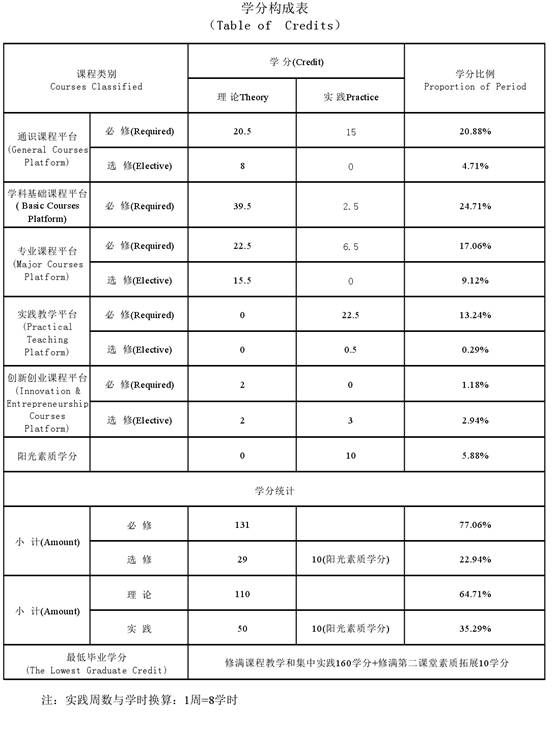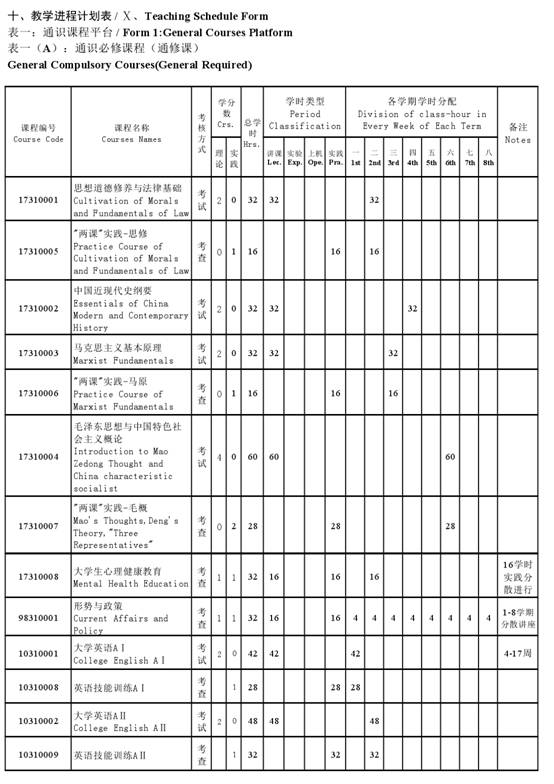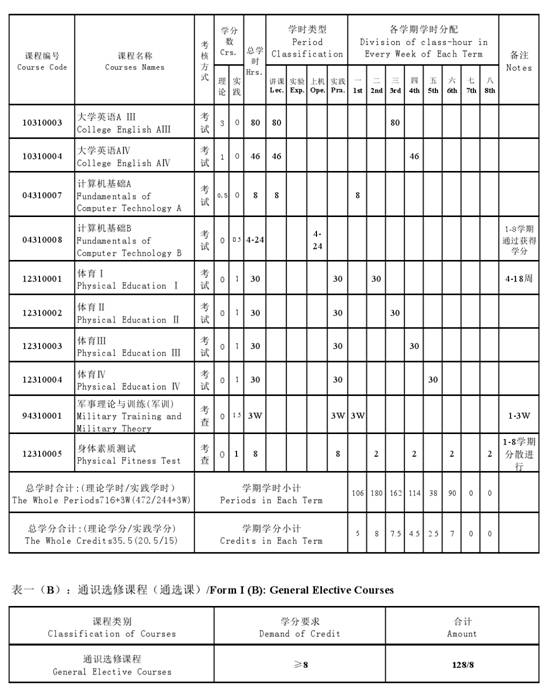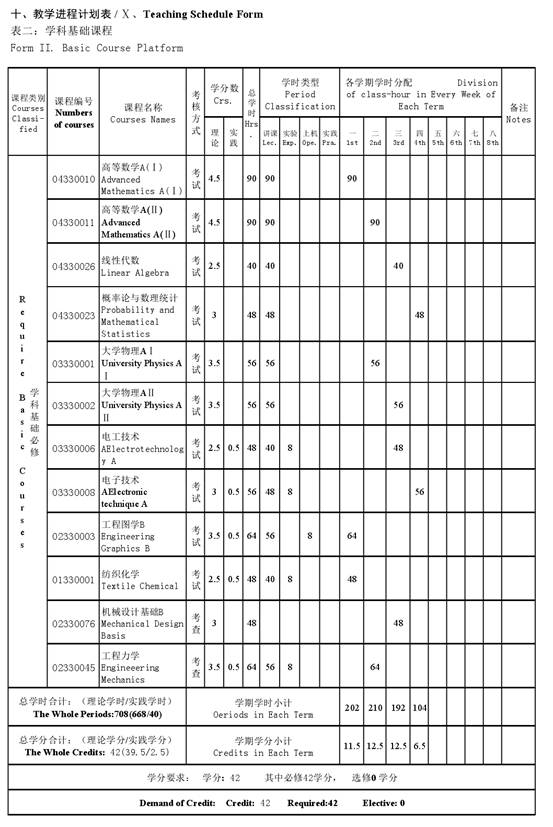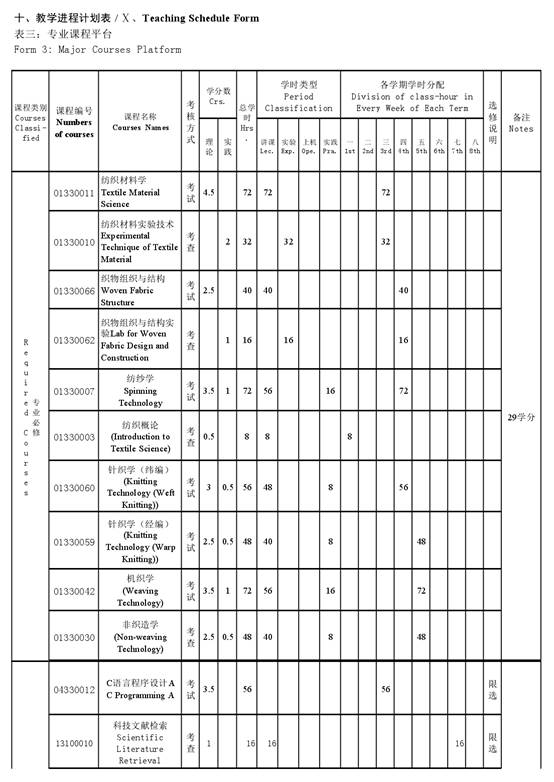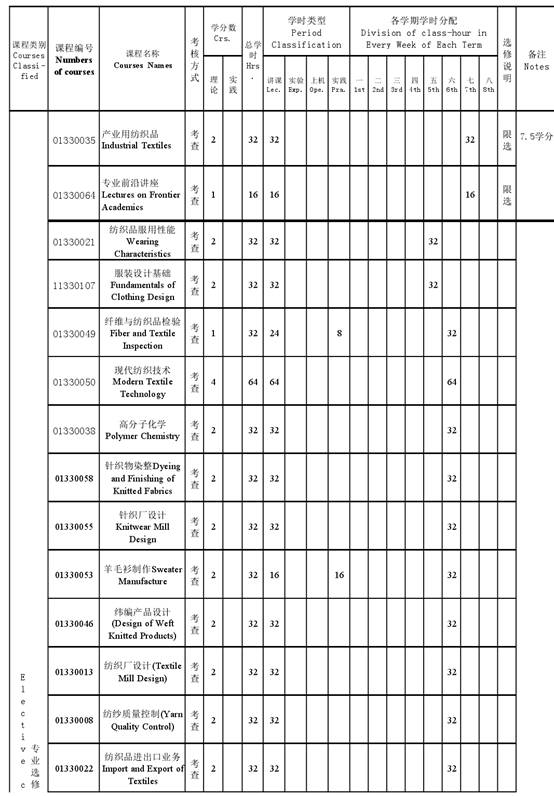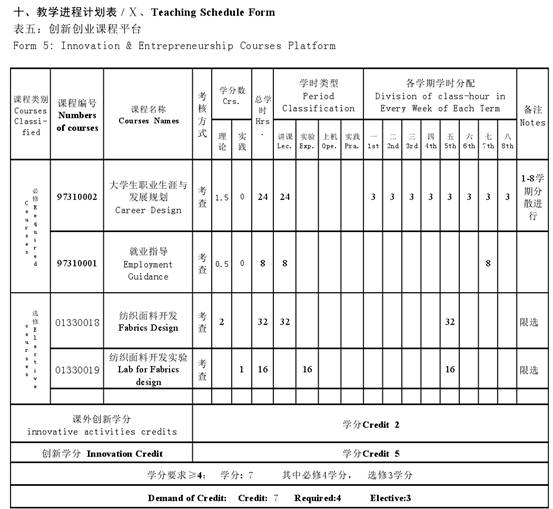纺织工程专业本科培养方案
Undergraduate Program for Textile Technology and Engineering
一、专业代码
081601
I、Major Code
081601
二、培养目标
II、Cultivation Objectives
本专业培养具有人文素养和社会责任感,系统掌握纺织工程领域专业知识和实践应用方法,具有创新意识和国际视野,具备相互协作和自主学习能力,能够运用多学科知识分析和解决纺织品加工过程中的技术问题,能成为企业技术骨干,能胜任纺织工艺设计、新产品开发、质量控制、运行管理和检验贸易等岗位的应用型创新人才。具体分为以下五个方面:
目标1:有良好的职业素养和社会责任感,有意愿并有能力服务社会;
目标2:具有工程知识、纺织专业知识和工程实践方法,分析和解决纤维及其制品的设计、加工及应用中的技术难题;
目标3:面向纺织相关领域,具有纺织工程设计与管理能力,可从事设计、开发、质量控制、运行管理和检验贸易等工作,能成为单位的技术、管理骨干;
目标4:具有团结协作精神和国际视野,能与国内外同行进行沟通和交流;
目标5:能自主学习和适应发展,实现能力和技术水平的不断提升。
The undergraduate (B.E) course in Textile Technology and Engineering aims to endow application-oriented innovative talents with humanistic quality and social responsibility, who systematically master the specialty knowledge of textile engineering and practical application approaches, have innovative consciousness and international perspective, possess the ability of cooperation and initiative learning, be capable to analyze and solve the technical problems in textile product process with multidisciplinary knowledge, and who are potential to become technical backbones in enterprises, and competent to do the work in textile process design, new product development, quality control, operation management, inspection and trade.
The objectives can be grouped into the following:
Objective 1: Possessing good professional quality and social responsibility, willing and capable to serve the society;
Objective 2: Being capable to analyze and solve the complicated technological problems in design, manufacturing and application of fiber and fiber products with engineering knowledge, textile specialty knowledge and engineering practice approaches;
Objective 3: Oriented to textile-related domain, possessing textile engineering design and management capability, and qualified for the work in design, development, quality control, operation management, and inspection and trade, etc., potential to become the technical and management backbones in enterprises;
Objective 4: Possessing team spirit and international perspectives, and being capable to communicate with domestic and overseas counterparts;
Objective 5: Being capable to learn initiatively and accommodate to development, and continuously enhance capacity and technical level.
三、毕业要求
Ⅲ、 Graduation Requirements
纺织工程专业毕业生应达到以下十二个方面的毕业要求:
1.工程知识:能够运用数学、自然科学、工程基础和纺织工程专业知识,解决纤维及其制品的设计、加工、检验等纺织工程领域复杂工程问题。
2.问题分析:能够应用数学、自然科学、工程科学和纺织技术的基本原理,结合对科技文献研究的结果,对纺织工程领域复杂工程问题进行识别、表达、分析和实证,并获得有效结论。
3.设计/开发解决方案:能够针对纺织工程项目设计与纤维制品开发的复杂工程问题,设计满足特定需求的工程项目方案或工艺流程,并能够在设计环节中体现创新意识,考虑社会、健康、安全、法律、文化以及环境等因素。
4.研究:能够基于科学原理并采用科学方法对纺织工程领域复杂工程问题进行研究,包括设计实验、分析与解释数据、并通过信息综合得到合理有效的结论。
5.使用现代工具:能够在纤维及其制品设计、加工中掌握并使用恰当的工程技术、方法和工具,并运用现代工程工具和信息技术对纺织工程领域复杂工程问题进行分析与预测,并能够理解其局限性。
6.工程与社会:了解与纺织工程学科相关的技术标准、知识产权、产业政策和法律法规的基础上,能基于纺织工程相关背景和知识进行合理分析,正确评价纺织工程实践和复杂工程问题解决方案和应用对社会、健康、安全、法律以及文化的影响,并理解应承担的责任。
7.环境和可持续发展: 在理解国家环境可持续发展战略及相关政策、法律和法规的基础上,能正确认识纺织工程领域复杂工程问题的工程实践对环境、社会可持续发展的影响。
8. 职业规范: 树立正确的世界观、价值观、人生观,具有良好的心理素质、人文社会科学素养,社会责任感强,能够在纺织工程实践中理解并遵守工程职业道德和规范,履行责任。
9.个人和团队:能够在多学科背景下的团队中承担个体、团队成员以及负责人的角色。
10. 沟通:能够就纺织工程领域复杂工程问题与业界同行及社会公众进行有效的沟通和交流,包括撰写报告和设计文稿、陈述发言、清晰表达或回应指令。并具备一定的国际视野,能够在跨文化背景下进行沟通和交流。
11. 项目管理:理解并掌握工程管理原理与经济决策方法,并能在多学科环境中应用。
12. 终身学习:具有自主学习和终身学习的意识,有不断学习和适应发展的能力。
Graduates from textile technology and engineering should reach the following twelve requirements:
1. Engineering knowledge: Be capable to solve complex engineering issues in textile engineering fields with mathematics, natural science, basic engineering knowledge and textile engineering professional knowledge.
2. Issue analysis: Be capable to identify, express, analyse, and demonstrate complicated engineering issues in textile technology and engineering and get effective conclusions with the basic principle of mathematics, natural science, engineering science, and textile technology, combined with the study on scientific literature.
3. Design/Development solutions: Be capable to design engineering project plans or technological processes that satisfy specific demands for complicated engineering issues in textile engineering project design and fibrous product development, with innovation and consideration on factors such as society, health, security, legislation, culture and environment.
4. Research: Be capable to conduct research on complex engineering issues in textile engineering field with scientific principle and scientific methods, including designing experiments, analysing and explaining data, and getting effective conclusions through information synthesis.
5.Utilizing modern technologies: Be capable to master and apply appropriate engineering technologies, methods, and tools in the design and manufacturing of fibrous products, to analyse and predict the complex engineering problems in textile fields with modern engineering tools and information technology, and understand their limitations.
6. Engineering and society: Know the technical criterion, intellectual property rights, industrial policy, laws and legislations; be capable to conduct reasonable analysis based on the background of textile engineering and technology, to correctly evaluate the influence of textile engineering practice and complex problem solutions on society, health, safety, legislation and culture, and understand the responsibility.
7. Environment and sustainable developments: Based on understanding the national sustainable-development strategy and corresponding policy, laws and legislations, be capable to correctly evaluate the influence of engineering practice of complex projects in textile engineering fields on environment and society sustainable development.
8. Career norm: Establish correct world outlook and philosophy of life and value. Possess good mental quality, and humanistic sciences and social sciences accomplishment. Possess strong sense of social responsibility. Understand and obey engineering career morals and norms, and perform the duty in textile engineering practice.
9. individuality and team: Be capable to act as an individual, team member or team leader under the multidisciplinary background.
10. Communication: Be capable to communicate effectually with counterparts or the public in regards to the complex engineering problems in the field of textile engineering, including report writing, document organization, presentation, clear expression and command responding. Be capable to communicate with others in a view of international perspective under cross-cultural background.
11. Project management: Understand and master engineering-management principle and economic decision-making method, and be capable to utilize them in multi-disciplinary environment.
12. Life-long learning: Possess the idea of initiative-learning and life-long learning, and the ability of adaptation to developments with continuous learning.
四、实践性教学环节
Ⅳ、Practical Teaching Taches
军训、社会实践、专业课程实验、纺织现场教学实习、工程训练I、生产实习、学年论文、机械设计课程设计、专业课程设计、C语言程序课程设计(A)、毕业实习、毕业设计(论文)。
Military Training, Social Practice, Professional Course Experiment, Professional Course Cognition Practice, Engineering training I, Production Practice, Academic Papers, Course Exercise of Mechanical Design, Professional Course Exercise, Course Design of C Programming (A), Graduation Practice, Graduation Design Project (Thesis). ⅠⅡⅢⅣⅤⅥⅦⅧⅨⅩ
五、毕业合格标准
Ⅴ、Graduation Eligibility
本专业员工在校期间必须修满课程教学和集中实践160学分。
Students can only be qualified to graduate from this major with at least 160 credits including course learning and intensive practical training .
六、学制与学位
修业年限:4年
授予学位:工学学士学位
Ⅵ、Length of Schooling and Degree
Duration: 4 years.
Degrees conferred: Bachelor of Engineering.
七、学时与学分
Ⅶ、Hours/Credits
八、教学进程计划表
Ⅷ、Teaching Schedule Form
